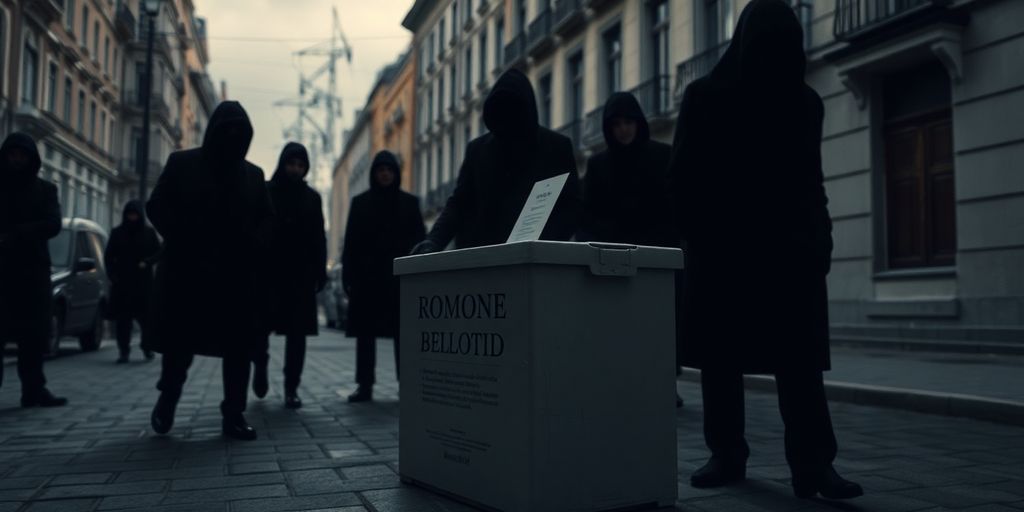In recent weeks, Romania has been at the center of a political storm, with allegations of external interference in its presidential elections. The Supreme Council of National Defense (CSAT) reported cyberattacks aimed at influencing the electoral process, particularly favoring independent candidate Călin Georgescu. As the country prepares for parliamentary elections, concerns about foreign influence, especially from Russia, have intensified, raising questions about the integrity of the democratic process.
Key Takeaways
- Cyberattacks were reported to influence the presidential elections in Romania.
- Călin Georgescu, an independent candidate, received preferential treatment on TikTok.
- The Kremlin denied any involvement in the electoral process.
- The upcoming parliamentary elections are seen as critical for Romania’s future direction.
Cyberattacks and Electoral Integrity
The CSAT revealed that cyberattacks were conducted with the intent to disrupt the integrity of the presidential elections. These attacks are believed to be part of a broader strategy by state and non-state actors, particularly from Russia, to influence public opinion and social cohesion in Romania. The report emphasized that Romania has become a priority target for hostile actions, especially in the current regional security context.
TikTok’s Role in Favoring Candidates
A significant point raised by the CSAT was the preferential treatment given to Călin Georgescu on TikTok. The platform allegedly failed to label him as a political candidate, which allowed him to gain massive exposure without adhering to electoral regulations. This lack of compliance with the electoral law has raised alarms about the fairness of the election process, as other candidates did not receive similar visibility.
Reactions from Political Leaders
In light of these developments, political leaders have voiced their concerns. Maia Sandu, the President of Moldova, urged Romanians to vote for a strong and European Romania, emphasizing the interconnectedness of Romania and Moldova’s futures. Meanwhile, Marcel Ciolacu, the former president of the Social Democratic Party (PSD), stated that the elections represent a choice between stability and chaos, reinforcing the importance of Romania’s alignment with the European Union and NATO.
Kremlin’s Denial of Interference
In response to the allegations of Russian interference, Kremlin spokesperson Dmitry Peskov dismissed the claims as unfounded. He stated that Russia does not interfere in the electoral processes of other countries, including Romania, and characterized the accusations as a reflection of Western tendencies to blame Russia for various issues.
Implications for Future Elections
As Romania approaches its parliamentary elections, the implications of the recent presidential election results are profound. The unexpected success of Călin Georgescu, who is associated with far-right ideologies and has expressed pro-Russian sentiments, has raised concerns about a potential shift in Romania’s political landscape. Analysts predict that the rise of extreme right parties could significantly alter Romania’s trajectory, especially in its relations with the EU and NATO.
The upcoming elections are critical not only for Romania’s internal politics but also for its role in the broader European context, particularly in light of ongoing tensions with Russia. The integrity of the electoral process will be under scrutiny as the nation grapples with the challenges posed by external influences and internal divisions.
Sources
- CSAT: Au existat atacuri cibernetice pentru influențarea alegerilor prezidențiale din România / TikTok l-a favorizat pe Călin Georgescu, dar nu-i dau numele – HotNews.ro, HotNews.ro.
- Maia Sandu despre alegerile din România: Kremlinul nu trebuie să dicteze relațiile Bucureștiului cu Chișinăul, Europa Liberă România.
- Alegeri parlamentare 2024. „România votează pe fondul acuzațiilor de interferență a Rusiei”, scrie The Guardian | Digi24, Digi24.
- Reacția Kremlinului după acuzațiile de interferenţă a Rusiei în alegerile din România – Știrile ProTV, Știrile Pro TV.
- Marcel Ciolacu: „Am votat ca România să fie în continuare în Uniunea Europeană și în NATO”, Digi24.






